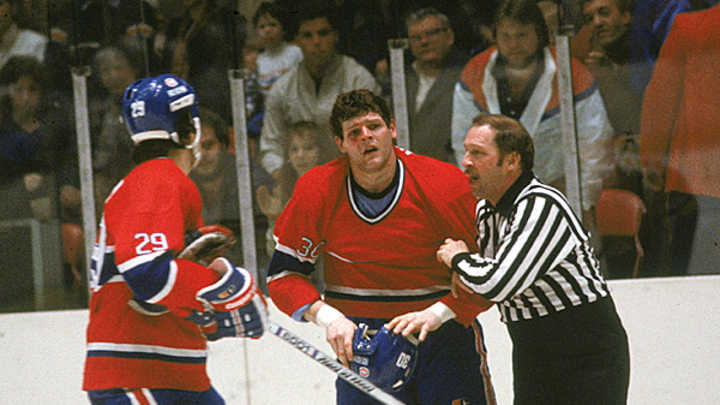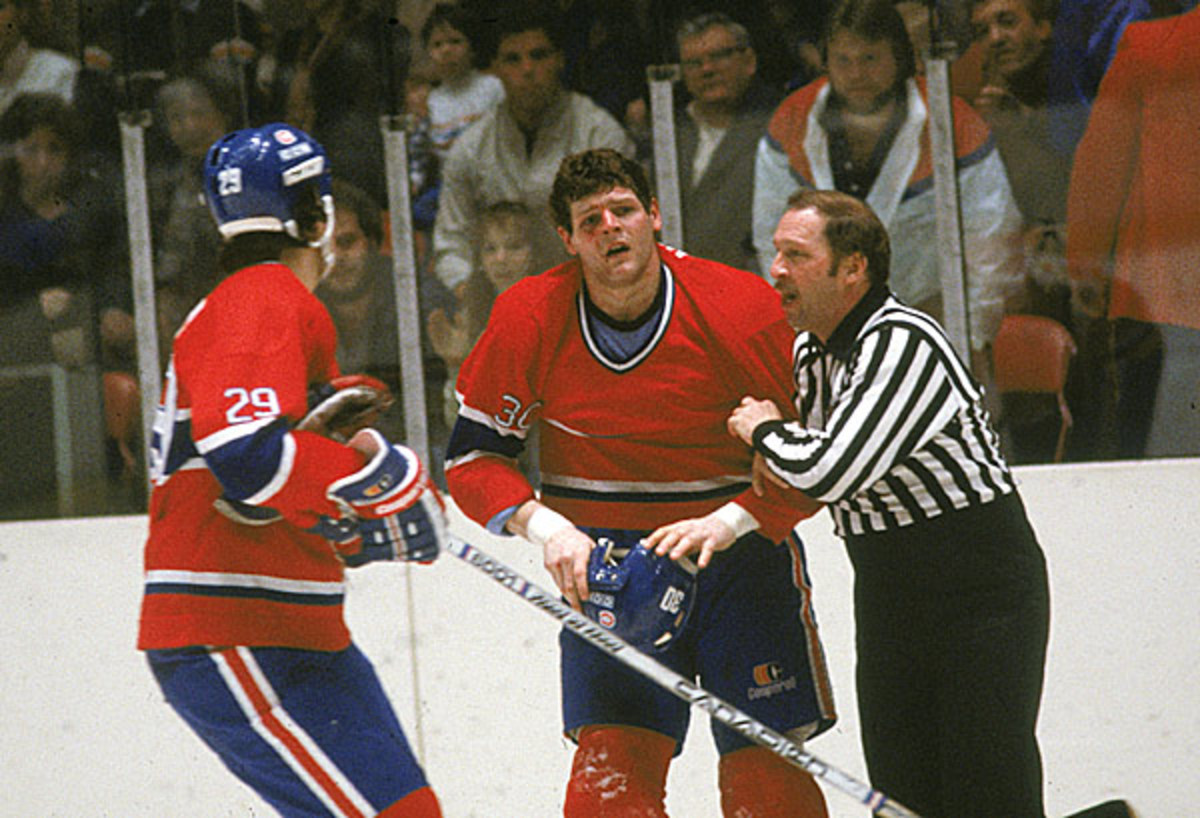New film tells of an enforcer's rise and fall

Fighter Chris Nilan devoted his body and soul to protecting his teammates for 15 seasons in the NHL. (Denis Brodeur/Getty Images)

By Stu Hackel
If fans embrace Slap Shot as the Casablanca of hockey films, The Last Gladiators is Apocalypse Now, a descent into the game's heart of darkness. Here, the hockey fighters' story doesn't trace cartoon lives of triumphant heroes who engage in laugh-a-minute punchouts that end in a championship parade. This documentary shows the aftermath, the tough guys' dénouement, as their lives -- and the role they played -- dissolve in a unique mixture of regret, shame, pride, self-destruction, and nostalgia.
Slap Shot was a film of its time that provided -- and still provides -- the hockey community with the laughs. The Last Gladiators is the sobering counterpoint, more in the tradition of some of Hollywood's great ring tragedies from Requiem For A Heavyweight to The Wrestler.
Directed by Alex Gibney, an Oscar, Emmy, Peabody, and Grammy award-winning documentarian, this film could not be more timely as it peers into the troubled lives of former NHL fighters. Centered around Chris Nilan, who for 13 seasons was one of the NHL's most feared heavyweights, the film explores the job he and his pugilist peers did, why they did it, the role is serves in the sport, and the toll it took on their lives.
It will be uncomfortable viewing for those who prefer to see hockey enforcers as one-dimensional entertainers. At the same time, Gibney traces the game's longstanding penchant for frontier justice, the origin of fighting and why it continues to have a role in the sport -- mainly the need for teams to protect their star players from physical intimidation and potential injury. And he doesn't neglect the appeal it has for a segment of fans. "The hockey fan needs fighting," David Singer of Hockeyfights.com tells the camera." It's an adrenaline rush."
But the lives of the fighters are what interests Gibney most, and the Boston-born Nilan is a most compelling subject. Gibney opens the film by showing Nilan's hands, and especially his battered knuckles. Nilan's nickname was (and is) "Knuckles" and the role he played in the NHL seemed to fit his personality. He was a scrapper from youth. The son of a Green Beret soldier, Nilan fell in love with the sport, brawled his way into a collegiate career and became an unlikely last round draft choice of the Canadiens in 1978. "Yankee Boy," his first Montreal coach Claude Ruel called him, and with an appealing mixture of humor and harsh truth, Nilan tells the story of his rise and fall as a Boston tough guy who becomes a star for the enemy team.
Ruel and others in Montreal schooled him in the game's finer points and Nilan developed into a very credible NHLer, a rarity among enforcers. From the days of the 1970s Flyers -- the Broad Street Bullies -- teams employed players whose sole purpose was to fight. They might play only a few minutes a game, with their offensive statistics negligible, especially compared to their penalty minutes.
That wasn't Nilan. A very effective checking forward for the Canadiens, he skated on a line with two of the best defensive forwards ever, Bob Gainey and Guy Carbonneau. He scored 16, 21 and 19 goals in three consecutive seasons, including the Stanley Cup campaign of 1985-86. Nilan also skated for Team USA in the 1987 Canada Cup, scoring twice. But he was a fighter, a very good one, who backed down from no one and wouldn't stop fighting even when urged to do so, as he was by then-Canadiens advisor Jacques Lemaire, who encouraged Nilan to focus more on being a good player.
But Nilan had noticed while watching the Bruins as a kid that fighters who stopped fighting didn't last long in the NHL. So he didn't stop. He never had second thoughts about protecting smaller teammates when bigger opponents tried to intimidate them. If some mayhem ensued, all the better. Gibney incorporates this 1986 episode in Boston Garden, where fans hated Nilan most of all, into the film.
It's one of many Nilan masterpieces. He loved his job, loved Montreal, the Canadiens and the adulation he received from their fans. But part of Nilan's nature and identity was to defend those who he felt needed defending and that ran him afoul of Canadiens coach Jean Perron, who Nilan felt treated him and some teammates unfairly. That led to his being traded to the Rangers in December 1988. It was a shock from which Nilan never recovered.
Playing in New York and later Boston, of all places, was never quite the same. Even though fans who once booed him now cheered him, Nilan confesses that his heart wasn't in it, although he still dropped the gloves when the situation called for it. However, the combination of age and injuries diminished his playing time and, after a run-in with Bruins coach Rick Bowness, Boston cut Nilan loose. The Habs picked him up again for a curtain call, but he called it quits in 1992.
From there, Nilan describes his restless, aimless decline. He couldn't hold a job, became addicted to painkillers after undergoing at least two dozen surgeries while playing, got into rehab, relapsed and went further into addiction with heroin. Tearful interviews with his family, including his clearly embarrassed father, chronicle their distraught reaction to his plight. A second stint in rehab seems to have worked and Nilan appears clear-eyed as he reflects throughout the film on where his life as taken him and why.
Nilan may be the central character, but Gibney wants to make the point that his story is not an exception. He punctuates the chapters of Nilan's life with interviews of other former enforcers like Donald Brashear, who can't stop playing and continues fighting in a Quebec semi-pro league; Tony Twist, who crashed his motorcycle after learning the Blues were not renewing his contract, never played again, and is unable today to find anything that comes close to providing him the joy that fighting in the NHL did; and Marty McSorley, whose protection allowed Wayne Gretzky to flourish in both Edmonton and Los Angeles, but whose stick-whack to Brashear's head in 2000 resulted in a criminal conviction and the end of his playing career. None of them fell as far as Nilan, but all fell nevertheless.
No one, not even Nilan, paid a steeper price for this career than Bob Probert, perhaps the best fighter of the era and a very credible player. A friend and foe of Nilan, Probert was also interviewed by Gibney, who later filmed a grim Nilan at Probert's funeral. While not part of the movie, it was later learned that Probert, who died from heart failure, also had CTE, the degenerative brain condition that can be caused by repeated blows to the head.
And yet, while some fighters today, in this film and in other accounts, say they hated the job, some Gibney interviewed, including Twist and Lyndon Byers, not only have no regrets, but loved fighting. It's a point to keep in mind when we read stories that claim enforcers play their role reluctantly.
This is very good documentary film-making by a talented director. It's well-paced, well-shot and has an important story to tell.
The Last Gladiators premiered this month at the Toronto Film Festival where it got generally good reviews. Nilan was singled out by reviewers as, in the words of David Rooney in The Hollywood Reporter, “a compellingly rough-hewn central figure.” He appeared at one showing and got a standing ovation from the audience afterward, which reportedly brought him to tears.
The film is not in general distribution and it's uncertain what the plans are for wider release. Some critics who have seen it believe it won't find an audience apart from sports fans and maybe not even beyond hockey fans. As far as Nilan is concerned, he told Mutsumi Takahashi of CTV Montreal on Tuesday (video) that he'd be happy if every NHL player saw it. "There's definitely a message that it can happen to you, it can happen to anybody," he said. "It will definitely open their eyes."
Especially those who, like Chris Nilan, have given their body and soul to the game.
